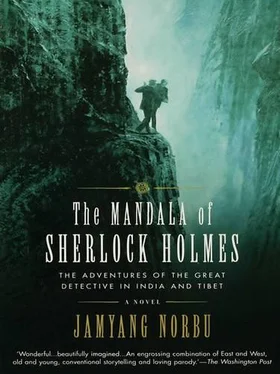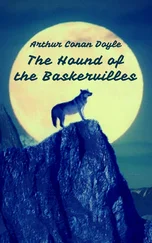I awoke to find Mr Holmes up in his purple dressing gown, smoking his pipe and reading The Times of India, while a railway bearer in white livery was serving breakfast on the raised drop-leaf table.
'Good morning, Huree,' said Holmes, turning a page of the newspaper. 'I trust you are well rested.'
'Oh yes, Mr Holmes. I slept like a baby. Only the bally hullabaloo in the next carriage disturbed my slumber somewhat. Surely it woke you up too, Sir?'
'Babuji!' said the bearer, who had, rather impertinently, been listening in on our conversation.'Last night two dacoits broke into the next carriage.'
'How did you know that?' I asked in the vernacular.
'Babuji, I entered this rail-ghari with chota-hazris at Jalgaon junction early this morning. There policewallahs took one dacoit from the next carriage. The ticket-babu told me that two dacoits had tried to rob a carriage full of Angrezi soldiers. Hai! Bewakoofi On learning their mistake, one fool jumped out of the window. The other was shot in the leg by a soldier sahib's bundook. I must go now to serve other hazris.'
'It is dashed unusual of dacoits to enter a carriage full of armed soldiers,' I mused, after translating the waiter's story to Mr Holmes. 'Generally, criminals of this sort are more careful and prepared in their enterprises.'
But Mr Holmes did not seem to share my doubts. There was a knowing twinkle in his eyes.
'By Jove, Mr Holmes,' I exclaimed, 'I perceive you have a fair idea about the matter. I beg of you not to perpetuate my ignorance.'
'Well,' said he, putting away his newspaper, 'it all begins with the drawing of an open hand. Remember I asked you last night what it might mean.'
'Yes, Sir. I told you it was the symbol of Kali.'
'I noticed such a sketch done in chalk, on the side of our carriage, just before the train left the station at Bombay.'
'But I saw nothing.'
'You saw, but you did not observe. The distinction is clear. For example, you must have made hundreds of train journeys, and frequently seen the wheels on the carriages.'
'Yes, Sir.'
'Then how many are there on each carriage?'
'How many? Four, I suppose. I cannot be sure.'
'Quite so! You have not observed. Yet you have seen. That is my point. Now I know that there are eight wheels on every carriage because I have both seen and observed. But getting back to the subject at hand: when I first saw the drawing I knew that it could only be either one of two things: a child's innocent scrawl, or a mark left for some definite purpose. When you informed me that the handprint was a symbol of the goddess Kali, and consequently of the Thugee cult, I knew that the game was up and our flight had been discovered.'
'But who could have done it? Mr Strickland only made reservations for our compartment just before the train came into the station, and we have been inside the carriage ever since then.'
'It could have been any one of those beggars clinging to our carriage windows. Probably Moran had taken the precaution of having watchers at the station, just in case I made a bolt for it.'
'Probably Ferret-Face was one of the watchers, Sir.'
'It is more probable that he was the organiser, and had a number of watchers covering various places at the station and reporting back to him when they spotted anything.'
'Yes, of course. I stand corrected, Mr Holmes.'
'Now, I could not call for police assistance merely because of the drawing, even supposing that we could find such help on a moving train. We must bear in mind that the police would have wanted to know my position in the scheme of things, which would have been rather awkward to explain. There was also the possibility that Moran could have disguised some of his men as policemen to take us unawares. So with not many options left, I rubbed out the sketch on the side of our carriage and chalked a similar one on the side of the next carriage, the one full of armed soldiers.'
'Acha! Of course. So they were Thugs who entered the carriage last night, not dacoits. Goodness gracious! If it were not for your vigilance, Mr Holmes, there would have been handkerchiefs twisted around our throats this morning. Baapre-baap!'
'It need not have come to that. There was always my revolver. But that would have been cutting it rather fine. Now what do we have here?' Holmes raised the cover of a dish and sniffed appreciatively. 'Ah, bacon and eggs. Could I serve you some, Hurree. If I am not mistaken, the consumption of a few rashers of bacon does not constitute any fundamental violation of observances in your particular faith.' We arrived at Delhi that night around eleven o'clock. I got up from my berth and peered out of the carriage window at the unlovely, fortress-like station built of dull red sandstone. It was hot, much hotter than Bombay – and very dusty. A lone bhisti spraying the platform from his buffalo-skin mussak, did not help to settle the dust or cool the air. The beggars were noisier here. I purchased a paan from a one-eyed vendor and chewed it till the train thankfully pulled out of the station. A little breeze wafted though the coach and I fell back to sleep.
Next morning at fiveo'clock the train rolled into Umballa city station where Mr Holmes and I disembarked. A light drizzle had settled the dust and freshened the morning air. As we breakfasted at the small but clean station restaurant, the Frontier Mail pulled out of the station on its long journey to the railhead at Peshawar.
There being no railway line to Simla at the time, we took the tonga service of the Mountain Car Company, which was available right at the railway station, and rattled off to Kalka, which is the first stop en route to Simla.
The tonga is a sturdy two-wheeled cart drawn by a single or two horses in curricle style, having back-to-back seating accommodation for four to six persons, apart from the driver. Since Mr Holmes and I had taken the whole tonga exclusively for ourselves, there was more than ample room for us and our few articles of luggage. Our tongawallah, or driver, was a shrivelled old greybeard with a dirty red turban wrapped around his bony head; but he kept the brace of the Kathiawar ponies moving at a brisk pace on the Kalka road, in the freshness of the rain-swept dawn.
For hours the tonga rattled along the hard, kankar-surfaced road, only stopping occasionally at a roadside parao, a travellers' resting place, to allow the ponies a breathing spell. We used the opportunity to stretch our legs and drink the jaggery-sweetened mahogany brown tea, which is the only kind of beverage available in these simple places.
About thirty-five miles out from Umballa city I espied the distant mountains floating above the far northern horizon. The slight shower early that morning had cleared the air so that the peaks were pellucid and brilliant against the sunny blue sky.
'Look Mr Holmes, the Himalayas! The abode of the gods -or so we are informed in the Skanda Puranas!
Sherlock Holmes lifted his head. An extraordinary change came over his face and his eyes sparkled like stars. All men are affected by their first view of the Himalayas, but in Mr Holmes's case it was as if his cares and worries had, at least momentarily, been lifted from his shoulders; as if he had been away on a long voyage and had now finally come home. For some time he gazed silently at the distant peaks.
'How does that thing by Beethoven go?' he murmured to himself. '"On the heights is peace – peace to serve." Tra la la… la… la… la… la la… lirra… lay…' [22]
Mr Holmes reached for the violin case by his side and, working the catches open, pulled out a rather battered-looking instrument. Tucking the violin under his long chin he set about tuning it. Finally he commenced to play. His eyes took on a dreamy look as the haunting notesflowedfrom his instrument. He was probably playing the piece by Beethoven. I really did not know. I must confess to a slight ignorance in matters musical.
Читать дальше












